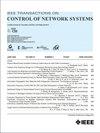Stability of Networked Evolutionary Games With Randomly Mixed Two-Level Reasoning
IF 4
3区 计算机科学
Q2 AUTOMATION & CONTROL SYSTEMS
引用次数: 0
Abstract
This article examines the stability of finite networked evolutionary games (NEGs) considering randomly available second-order neighbors' information. A new strategy update rule (SUR) with randomly mixed two-level reasoning is proposed. The idea behind two-level reasoning is that each player predicts his/her neighbors' strategies based on the second-order neighbors' information if available, and then updates his/her own strategy accordingly. Since this information is only available randomly, the induced SUR is a mixed SUR based on one-level and two-level reasoning. The algebraic form of the profile dynamical system is derived, and the profile's transition probability matrix is calculated. Based on these, necessary and sufficient conditions for a Nash equilibrium (NE) stability are proposed. In addition, it is proved that under mild probability conditions, if an NE of an NEG with one-level reasoning is stable, then it is also stable for the NEG with the induced randomly mixed two-level reasoning. An illustrative example is provided to demonstrate the proposed results.具有随机混合两级推理的网络进化博弈的稳定性
本文研究了考虑随机二阶邻居信息的有限网络进化博弈的稳定性。提出了一种新的随机混合两级推理策略更新规则(SUR)。两级推理背后的思想是,每个玩家根据二阶邻居的信息预测他/她的策略,然后相应地更新他/她自己的策略。由于该信息是随机的,因此所导出的SUR是基于一级和二级推理的混合SUR。导出了剖面动力系统的代数形式,并计算了剖面的转移概率矩阵。在此基础上,给出了纳什均衡稳定的充分必要条件。此外,还证明了在温和概率条件下,如果一级推理的NEG的NE是稳定的,那么诱导随机混合两级推理的NEG的NE也是稳定的。给出了一个说明性的例子来证明所提出的结果。
本文章由计算机程序翻译,如有差异,请以英文原文为准。
求助全文
约1分钟内获得全文
求助全文
来源期刊

IEEE Transactions on Control of Network Systems
Mathematics-Control and Optimization
CiteScore
7.80
自引率
7.10%
发文量
169
期刊介绍:
The IEEE Transactions on Control of Network Systems is committed to the timely publication of high-impact papers at the intersection of control systems and network science. In particular, the journal addresses research on the analysis, design and implementation of networked control systems, as well as control over networks. Relevant work includes the full spectrum from basic research on control systems to the design of engineering solutions for automatic control of, and over, networks. The topics covered by this journal include: Coordinated control and estimation over networks, Control and computation over sensor networks, Control under communication constraints, Control and performance analysis issues that arise in the dynamics of networks used in application areas such as communications, computers, transportation, manufacturing, Web ranking and aggregation, social networks, biology, power systems, economics, Synchronization of activities across a controlled network, Stability analysis of controlled networks, Analysis of networks as hybrid dynamical systems.
 求助内容:
求助内容: 应助结果提醒方式:
应助结果提醒方式:


